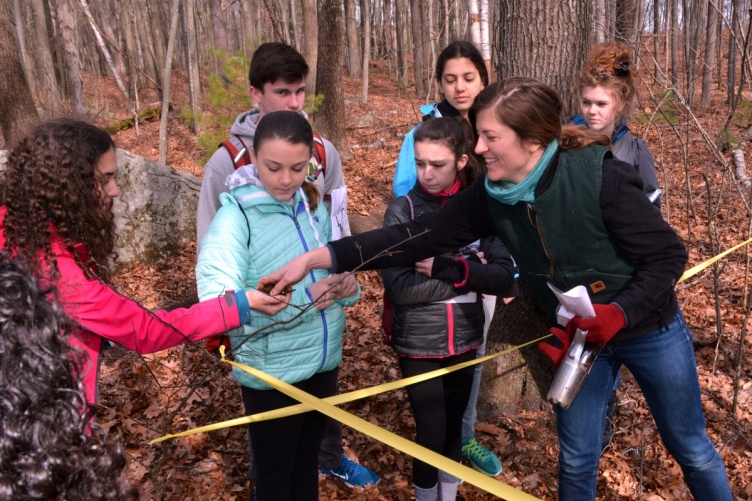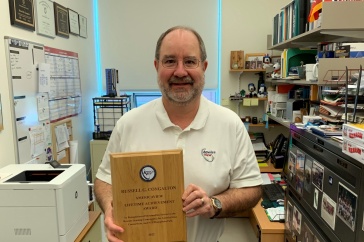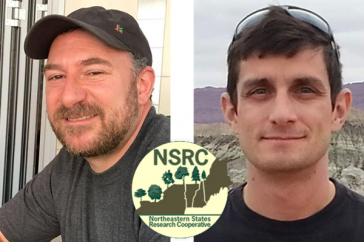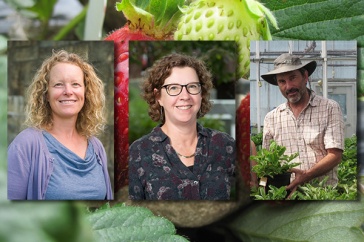
Andrea Jilling speaks with young scientists participating in the 2016 NH Envirothon. She hopes her research will improve our ability to measure soil nutrient supply and help reduce our reliance on fertilizers. Credit: Ron Sher
Andrea Jilling, who will graduate in 2019 with a doctorate in natural resources and Earth system sciences, conducted research with New Hampshire Agricultural Experiment Station scientist Dr. Stuart Grandy. Learn about why she chose UNH for her graduate studies, what she researches and what she's gained from her research experience.
Why did you decide to pursue your graduate degree at UNH?
Prior to joining UNH, I worked on a series of vegetable farms in Connecticut, Quebec, and New Hampshire. I was always drawn to the nuances of soil management and realized that a graduate program would give me the space to think more deeply about the below-ground world. A mentor suggested that I reach out to Dr. Stuart Grandy who had recently started a faculty position at UNH. It was immediately clear that my interests aligned well with Dr. Grandy's research program but also with the natural resources department, in general. I was also impressed by the breadth of research within the department and the overall sense of connection and community.
What is the focus of your research interests and why?
Most agricultural soils have "enough" nutrients to support a productive crop, but most of this inherent fertility is locked up in soil organic matter. Microbes can transform this soil organic matter into a form plants can use, but it is challenging to predict when, how, and where this transformation takes place. I study how plants and microbes interact to release nutrients from soil organic matter. Specifically, I examine a source of nutrients that is generally thought of as unavailable to plants: organic matter bound to tiny silt and clay particles. My research looks into strategies that plants and microbes employ to unlock nutrients from silt and clay-associated organic matter. I hope that my research will improve our ability to measure soil nutrient supply and help reduce our reliance on fertilizers.

What is it like having NH Agricultural Experiment Station researcher Dr. Stuart Grandy as your mentor?
Dr. Grandy is an incredibly supportive and adaptive advisor. He truly personalizes his mentoring and advising style to make sure his students are on the right path. I also appreciate that he cares just as much about academic success as he does student health and wellness. I am never burdened with guilt when I take time for my mental or physical well-being. As a result, I feel like I have more space to think freely in my research and in my day-to-day life. At the same time, Dr. Grandy has pushed me to think more deeply and critically about my research ideas. I never would have imagined pursuing the research questions and topics that now form the basis for my dissertation without Dr. Grandy's guidance.
What would you tell prospective graduate students about your research experience? What do you feel you gained most from it?
It is hard to prepare for the many highs and lows of a graduate program. There will be many unexpected snags and surprising successes along the way. Celebrate the small joys and the big wins with friends, family and peers. At the same time, working so intensely on a specific project can be taxing mentally and physically. Beyond your community of friends, there are always resources across campus to help you work through academic or personal trials.
Overall, my research experience has been deeply rewarding. Outside of the analytical skills I have gained and the friendships formed, I also feel more confident in my ability to generate and defend my own ideas.
What are your plans after graduation?
I am keeping an open mind, but I would like to find a postdoctoral research position that will allow me to run more field or greenhouse-based experiments. It would be great to continue studying soil organic matter dynamics while also learning new skills and techniques.
Did you receive support for your research from Stuart’s NHAES funding?
My research assistantship this year is supported by NHAES funding. I am grateful to the organization for their continued support of fundamental soil science research.
Founded in 1887, the NH Agricultural Experiment Station at the UNH College of Life Sciences and Agriculture is UNH’s original research center and an elemental component of New Hampshire's land-grant university heritage and mission. We steward federal and state funding, including support from the USDA National Institute of Food and Agriculture, to provide unbiased and objective research concerning diverse aspects of sustainable agriculture and foods, aquaculture, forest management, and related wildlife, natural resources and rural community topics. We maintain the Woodman and Kingman agronomy and horticultural research farms, the Macfarlane Research Greenhouses, the Fairchild Dairy Teaching and Research Center, and the Organic Dairy Research Farm. Additional properties also provide forage, forests and woodlands in direct support to research, teaching, and outreach.
-
Written By:
Lori Tyler Gula, PhD | NH Agricultural Experiment Station | lori.gula@unh.edu | 603-862-1452



















































